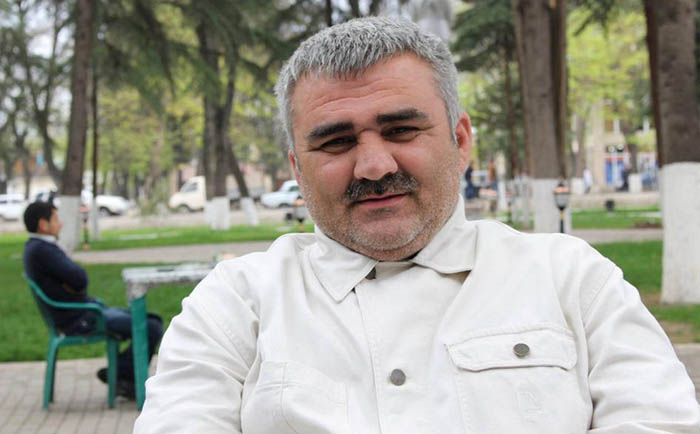Index relies entirely on the support of donors and readers to do its work.
Help us keep amplifying censored voices today.
[vc_row][vc_column][vc_column_text]

Afgan Mukhtarli. Credit: Meydan TV
Index on Censorship is extremely concerned at the news of journalist Afgan Mukhtarli being detained and facing prosecution in Azerbaijan after being disappeared from Georgia.
Freelance Azerbaijani journalist Afgan Mukhtarli was reported missing in Tbilisi, Georgia on the evening of 29 May by his wife Leyla Mustafayeva. Eurasianet reported that Mustafayeva said that her husband last called her when he was just a few blocks away from their home, but he never showed up.
The Georgian police stated on 30 May that a search was underway for the journalist, but later, the independent Azeri news agency Turan reported that the Azerbaijani border service department detained Mukhtarli.
Independent investigative journalist Khadija Ismayilova confirmed that Mukhtarli was kidnapped from his neighbourhood where he was forced into a car, his hands were tied and he was beaten. Mukhtarli sustained serious injuries. His lawyer, Elchin Sadigov, told the Committee to Protect Journalists: “He was beaten, has a broken nose, bruises all over his head and right eye, his rib may be broken.”
He was then taken across the border into Azerbaijan by car without his passport.
Mukhtarli is being charged with trespassing, smuggling and resistance to law-enforcement (violations of Articles 318.1, 206.1 and 315.2 of the criminal code), his lawyer confirmed. The Azerbaijani police also claim Mukhtarli was in possession of 10,000 EUR during the police search.
“Georgia has long been perceived as a safe haven for Azerbaijani dissidents, but the disappearance of Afgan Mukhtarli and other incidents are deeply concerning,” Melody Patry, Index’s head of advocacy said. “The charges brought by Azerbaijan’s prosecutors against Mukhtarli are spurious and Index calls for his immediate and unconditional release. We further call on the Georgian authorities to swiftly investigate the kidnapping of the journalist.”
Mukhtarli, who has contributed to various independent outlets, including Meydan TV, fled to Georgia from Azerbaijan in 2015, after receiving threats over his investigative reporting on corruption in the Azerbaijani Defence Ministry.
Twelve days before, the journalist said in an interview with independent online news outlet Jam News, that he and his wife, who is also a journalist and an activist, were both under surveillance.[/vc_column_text][/vc_column][/vc_row][vc_row][vc_column][vc_basic_grid post_type=”post” max_items=”4″ element_width=”6″ grid_id=”vc_gid:1496242648118-e98a8e80-c3a5-0″ taxonomies=”7145″][/vc_column][/vc_row]
[vc_row][vc_column][vc_column_text]On Wednesday 24 May 2017, Egypt banned at least 21 websites, including the main website of Qatar-based Al Jazeera television, The Huffington Post and prominent local independent news site Mada Masr.
Mada Masr, as well as 20 other websites, were blocked by the Egyptian authorities for “supporting terrorism and extremism and spreading lies,” according to the state-run news agency Mena. Two Egyptian security sources have also indicated to Reuters that the outlets were blocked for either having ties with the Muslim Brotherhood, or for being funded by Qatar.
Mada Masr, an independent media founded in 2013, is one of the few independent voices left in Egypt, producing critical and engaged journalism. After the block, Mada Masr continues to publish content via its social media channels.
The act of blocking these 21 websites violates international standards in this area. Egypt has signed and ratified the International Covenant on Civil and Political Rights (ICCPR), and must follow the guidance of the Human Rights Committee, the only official body charged with interpreting the treaty. Its General Comment 34 emphasises that restrictions on speech online must be strictly necessary and proportionate to achieve a legitimate purpose. We firmly believe that none of these conditions have been fulfilled, particularly given the block’s extrajudicial character.
As members of civil society working for the free flow of information and digital access and freedom, we strongly condemn blocking access to these 21 websites by the country’s authorities. Such action is an act of censorship and infringement on the freedom of expression and information. Independent media must not pay the price of current political disputes between countries in the region—such as that between Egypt and Qatar.
The signatories of this statement are committed to the fundamental principles of freedom of expression and access to knowledge and information. We, the undersigned, call on the Egyptian authorities to uphold the freedom of the press and reinstate access to all 21 blocked news websites.
Signatories:
Access Now
SKeyes Center for Media and Cultural Freedom
Bahrain Watch
CFI – Agence française de coopération médias
Collaboration for ICT Policy in East and Southern Africa
Committee to Protect Journalists
Cooperativa Sulá Batsú RL
Derechos Digitales
The Egyptian Center for Public Policy Studies
Electronic Frontier Foundation
Free Press Unlimited
Global Forum for Media Development
Index on Censorship
Internet Sans Frontières
League of African Cyber-Activists and Bloggers
Maharat Foundation
MARCH Lebanon
OpenNetAfrica
Social Media Exchange
The Tahrir Institute for Middle East Policy
7iber
Paradigm Initiative[/vc_column_text][/vc_column][/vc_row][vc_row][vc_column][vc_basic_grid post_type=”post” max_items=”4″ element_width=”6″ grid_id=”vc_gid:1496241442672-1f637b67-02f2-0″ taxonomies=”147, 64, 1721″][/vc_column][/vc_row]
[vc_row][vc_column][vc_column_text]
Today the trial of Bahraini human rights activist Nabeel Rajab has been pushed back yet again, this time until 12 June 2017. His next trial date will take place just one day shy of a year since he was detained.
The fifty-four-year-old Rajab is currently detained in Kalaa Hospital following surgical complications from a procedure on 5 April. He has spent most of the past year in solitary confinement, resulting in a deterioration of his health.
Sayed Ahmed Alwadaei, director of advocacy Bahrain Institute for Rights and Democracy, said: “Today’s mock trial, in which Nabeel is punished for speaking the truth, shows how desperate Bahrain’s rulers are to silence and punish those who dare to expose the truth. The authorities have treated him in a degrading way for the past year and for what. This would not happen without the green-light from its allies Washington and London. This disastrous policy must be overturned.”
Rajab was jailed on 13 June 2016 for exposing human rights abuses in Bahrain, insulting Saudi Arabia and spreading “rumours and false news”. In September 2016, he published a letter in the New York Times highlighting the fact that journalists and NGO’s cannot enter Bahrain. After his letter was published, he was accused of “false news and statements and malicious rumours that undermine the prestige of the kingdom”.
Rajab’s trial on 12 June will address the accusation of spreading false news that journalists and NGO’s are being barred from the country. Another trial, which has been postponed 13 times, is scheduled for 14 June. It will address charges on his criticism of Bahrain’s capitol’s role in the military campaign against Yemen. If convicted Rajab could face 18 years in prison.[/vc_column_text][/vc_column][/vc_row][vc_row][vc_column][vc_basic_grid post_type=”post” max_items=”4″ element_width=”6″ grid_id=”vc_gid:1496328210946-80160fea-3861-4″ taxonomies=”3368″][/vc_column][/vc_row]
[vc_row][vc_column][vc_column_text]
On 16 May the Venezuelan government issued Executive Order 2489 to extend the “state of emergency” in Venezuela, in place since May 2016. This new extension authorises internet policing and content filtering. This measure deepens the restrictions to the free flow of information online even more. They include the blocking of streaming news outlets, such as VivoPlay, VPITV, and CapitolioTV. Other serious practices that prevail in Venezuela are the aggressions of military and police personnel to journalists and civilian reporters, and the detention of citizens in the wake of content published on social networks.
This happens in a context of a general deterioration of telecommunications, as a consequence of the divestment in the sector in the last 10 years. This has turned Venezuela into the country with the worst internet connection quality in the Latin American region. Given the censorship practices applied to traditional media, the internet has become an essential tool for the freedom of expression and access to information of the Venezuelan people.
The measures taken by the Venezuelan Government to restrict online content constitute restrictions to the fundamental rights of Venezuelan citizens and, as such, do not comply with the minimum requirements of proportionality, legality, and suitability. The Venezuelan Government has systematically ignored civil society requests regarding the total number of blocked websites. To this date, there is evidence of the blocking of 41 websites, but it is suspected that many more websites are being blocked. The legal and technical processes applied by the government to determine and execute the blocking of websites remain unknown.
These kinds of practices affect the exercise of human rights. In a joint release, the rapporteurs for freedom of expression of the UN and the IACHR condemned the “censorship and blocking of information both in traditional media and on the internet”. During the last few months, three streaming tv providers have been blocked without a previous court order. Moreover, the Government has used unregulated surveillance technologies that affect the fundamental rights of citizens, such as surveillance drones to track and watch demonstrators, while at the same time expanding its internet surveillance prerogatives, through the creation of bodies such as CESPPA.
In addition to this, the government has implemented mechanisms for the collection of biometric data without citizens being able to determine their purpose nor who has access to such information. The official discourse towards the internet, and specifically to social networks, is disturbing: the director of the National Telecommunications Commission has recently declared that social networks are “dangerous” and a tool for “non-conventional war”.
The sum of this factors, aggravated by the passage of time and the deepening of the social and political crisis, outlines the creation of a state of censorship, control, and surveillance that gravely affects the exercise of human rights. Quality access to a free and neutral internet is recognised internationally as a necessary condition for the exercise of freedom expression, communication and the access to information, and as a precondition of the existence of a democratic society. In that regard, the undersigned civil society and academic organisations wish to set our position in the following terms:
We express our condemnation to the extension of the state of exception in Venezuela, as well as to the restrictions to the free flow of online content that derive from it.
We manifest our concern for the growing deterioration of internet access infrastructure and telecommunications in Venezuela. The maintenance of such systems is of vital importance for education, innovation, and the communication of Venezuelans.
We emphasise that the use and implementation of technological tools such as drones and biometric identification systems must fit human rights standards and not affect the fundamental freedoms of citizens, in particular their privacy and autonomy.
We insist that all measures that restrict the free exercise of fundamental rights, such as the blocking of web pages, must comply with the minimum requisites of proportionality, legality and suitability, and in consequence, must be only adopted by judicial authorities following a due process.
We request the ending of the harassing actions and insulting speech conducted by public servants online against NGOs and human rights activists that document and denounce acts through digital platforms.
We demand the cessation of military and police aggressions against journalists and citizen reporters.
We request transparency on the actions taken to restrict internet traffic and content and demand an answer to the requests for public information made by civil society regarding the practices of content blocking and filtering executed by the public administration.
Signed,
Derechos Digitales
Instituto Prensa y Sociedad de Venezuela
Acceso Libre (Venezuela)
(DTES-ULA) Dirección de Telecomunicaciones y Servicios de la Universidad de los Andes
Venezuela Inteligente
Public Knowledge
Access Now
Espacio Público (Venezuela)
Hiperderecho (Perú)
Son Tus Datos (México)
Alfa-Redi (Perú)
Centro de Derechos Humanos de la Universidad Católica Andrés Bello
EXCUBITUS Derechos Humanos en Educación
IPANDETEC (Panamá)
Sursiendo, comunicación y cultura digital
Red en defensa de los derechos digitales, R3D
Global Voices Advox
Asuntos del Sur
Internet Sans Frontières (Internet Without Borders)
Center for Media Research – Nepal
Index on Censorship[/vc_column_text][/vc_column][/vc_row][vc_row][vc_column][vc_basic_grid post_type=”post” max_items=”4″ element_width=”6″ grid_id=”vc_gid:1496155906014-ceb40fec-308b-10″ taxonomies=”13, 6914″][/vc_column][/vc_row]